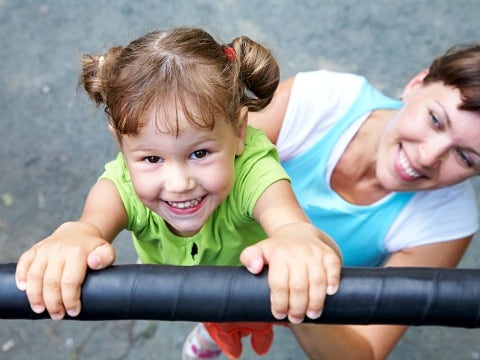Good-Intentioned Parenting Gone Bad: Why 'Perfect' Isn't The Goal
We strive to be perfect parents, but are our actions really best for our children?

My entry into motherhood was an unusual one in that not long after I had my first child, I started a psychological internship at an adolescent section of the mental health unit of a local hospital. The adolescents that I worked with probably gave me the best parenting advice I've ever received: they told me how little their parents listened to them, accepted them for who they were or who they wanted to be, and how frequently they felt unloved and alone.
Quite sure that I was a far better parent than these emotionally unavailable ogres, I looked forward to my first meeting with them at the weekly parent group at the hospital. Charged up and ready to teach them the parent gospel as only a psychology student and new mother can do, I watched these parent vagabonds walk into the meeting. I was shocked when they appeared to be less monster-like than I had predicted. I was sure that their true colors would appear the minute they opened their mouths. Yet again I was wrong when they showed themselves to be intelligent, hard working, desperately worried for their children, and most of all, every bit in love with their children as I was with mine.
How could their children be suffering when these parents were relatively normal, present, and involved? Were the teens lying? It didn't seem to be the case, as the parents often validated their stories. How was it possible that good people and good-intentioned parents could raise children who seemed desperately unhappy, lost, and heading down scary paths? Honestly, the clarity of the answer didn't come to me until a few years later when my son was heading into athletics at school and I was able to observe parents and children in these settings versus the hospital.
Good intentioned parents were often so well meaning and so concerned about their children that they literally didn't see them. They were so worried about a baseball being hit properly that they missed the joy on their children's faces as they ran the bases and gleefully tackled each other at home base. These parents were so apprehensive about perfect grades that they missed the glorious moment of learning that comes from the playground or a messy art project. Even worse, parents were so anxious and worried that their children didn't look right or behave appropriately that they missed the subtle signs of a child being bullied or struggling emotionally.
Here's the thing: if you are in a constant state of worry or anxiety about your children, can you really love them in a healthy and present way? Can you really catch the subtleties of their needs and emotions when you are so focused on your own fears about them? I often fall into this worry pit myself and then I remember the adolescents from the hospital, and the sadness on their faces as they told me that their parents just wouldn't listen to them. These adolescents worried that their parents didn't love them because they didn't understand or accept them or their choices. And that led to depression, anxiety, and harmful behaviors.
I'm not suggesting that children who struggle with mental illness always do so because of their parents. However, I am suggesting that sometimes the simplest of parenting behaviors can make the greatest positive impact on your children. Worrying almost seems to be a parenting badge of honor these days yet worrying is typically useless, draining and keeps you from enjoying your children and your life with them.
The best tips that those hospitalized adolescents gave me are relatively simple: listen — really listen — to your children without judgment, criticism, or "here's what you need to do" advice. Allow them to express who they are without negative comments from you. This doesn't mean you don't set limits on your children or give consequences for inappropriate behavior. It means to let them have their own dreams, wishes, and desires. Stop worrying about things you can't control, drop the anxious behavior that makes your kids more nervous than necessary, and be present as frequently as possible. Acknowledge your children, validate their feelings, and love the heck out of them even when they are unlovable.
There are no guarantees that your kids won't have emotional struggles, but it doesn't hurt to stack the odds with some solid parenting advice from the source. Good intentions aren't always good parenting, sometimes we need to step out of our own fears and step into our children's world to help them navigate. It's not always easy but it is certainly worth the effort.
Lisa Kaplin is a psychologist and life coach at www.smartwomeninspiredlives.com You can reach her at Lisa@smartwomeninspiredlives.com Join her for her free monthly teleclass. August's class is 3 guaranteed ways to have a happy homework household! Here's the link to sign up: http://smartwomeninspiredlives.com/events/
More parenting advice from YourTango

